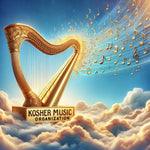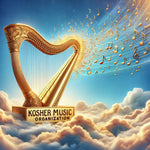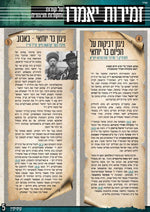Kosher Track is a set of guidelines for playing kosher music at events. It provides clear descriptions of what makes music kosher or treif. It sets a clear standard for musicians to follow in great detail. To those whom these concepts may seem strange or farfetched, a second, annotated version will be available, showing the sources for these guidelines. In these annotations, it will be revealed how much of what is referred to today as "Jewish" music, is in fact not kosher.
There is a difference between "Jewish" music and "Kosher" music. Jewish music means that either the composer, singer, musician or salesman of the song was born by a Jewish mother. (Contemporary philosophers and musicologists have made numerous attempts to define "Jewish music." After all said and done, this is more or less what it boils down to.)
"Kosher" music on the other hand, refers to music that creates a positive influence on a person. "Treif" (non kosher) music refers to music that creates a negative influence on a person. If the song is neutral in its influence, it is still kosher, as it does not contain negative influences (although it may not have much value.) Positive influences are feelings that cause people to get closer to Hashem, do mitzvos, and have good middos, such as ahavas Hashem, yiras Hashem, emunah, bitachon, anavah, rachamim, etc. Negative influences are feelings that cause people to do aveiros and distance themselves from Hashem. The most prevalent of these aveiros are עבודה זרה, גילוי עריות, שפיכת דמים and having bad middos such as גאוה, עזות, אכזריות, כעס, ליצנות, שחוק וקלות ראש etc.
Unfortunately, all these negative influences have crept into the Jewish world from the world around us through music. Many people recognize that there are serious problems nowadays with bad middos and wildness at simchos and that something terribly wrong is being done, but they lack the ability to pinpoint the issue. The Kosher Track Guidelines has therefore come to shed light on this topic and provide clear and concise guidelines with fine details as to what makes music kosher or treif.
Ba'alei simcha often want kosher music, but cannot properly express what they want. This can be for any of several reasons. They may lack proper understanding of what is kosher and treif music. They may lack a means of communicating such ideas in words and examples. (This is quite normal as music is all about feelings and it is difficult for most people to clearly define a feeling.) Or they may not be musically inclined, etc.
These guideline were therefore created for musicians to be able to follow. There are two versions of these guidelines. The first version is concise, using words and technical terms known to musicians.
The second version is for the general public. This version is highly annotated and explains the historical background of today's music as well as several concepts and technical terms. Also included are hundreds of audio examples (and video examples when applicable) explaining these details to allow the general public to grasp the concepts even if they lack a musical background.
The goal of these guidelines is for anyone making a simcha who wants kosher music, to be able to pick any name from our list of kosher musicians, tell them they want "Kosher Track" and be guaranteed that they will only play kosher music. This is the idea of Kosher Track.
Musicians who want to get enlisted must first apply to the Kosher Music Organization. They must first prove that they can play music at the standards set forth within the guidelines and be verified through audio and video recordings of such. Once approved, they will be listed in the"Simcha Section" under the kosher musicians list.
It is highly recommended that any musician or singer that agrees to play Kosher Track, should have this written in a contract. (A sample contract will be available in the Kosher Track section soon.) Musicians and singers, even those who want to play kosher, often lack opportunities to play at such events. As a result, they may also agree to play at a substandard event. Kosher Track allows for this. Only the specified simcha into which both the ba'al simcha and musician agree to play kosher track is the musician required to play Kosher Track.
A unique feature that Kosher Music Organization provides is an interactive musician and singer list. Each musician and singer has the opportunity (at his discretion) to have his own webpage with audio and/or video samples. Ba'alei simcha are usually reluctant to hire anyone without first hearing (and possibly seeing) how they play and many good musicians and singers lack their own website to demonstrate their skills. Kosher Music Organization therefore provides a platform where each musician and singer can demonstrate how their true intention is to play kosher music as well as their level of professionalism. This is beneficial for both the ba'alei simcha to be able to find kosher musicians and singers, as well as for the musicians and singers themselves, who will be able to find customers to play kosher music at their events as the musicians and singers so desire.
Currently, both versions of the Kosher Track Guidelines are only available to musicians and Rabbonim. We are currently working on the audio examples for both the first (concise) version as well as the second (annotated) version.
To help sponsor this project, please go to our Donate page, or email us at info@koshermusic.org.
If you are a musician or Rov and would like to review the Kosher Track Guidelines, please email us at info@koshermusic.org or use our contact form.




